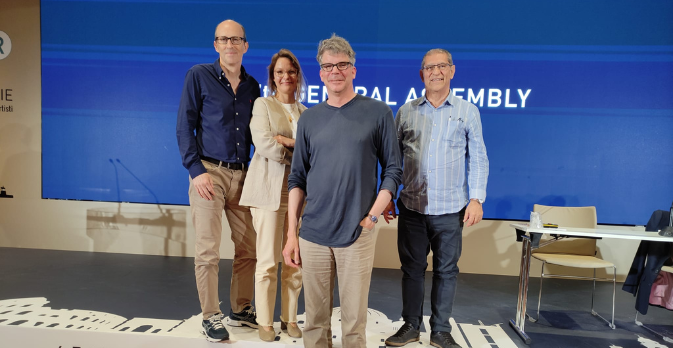PPL CEO Peter Leathem re-elected to the Board of global trade body SCAPR
Peter Leathem, Chief Executive Officer of the music licensing collective management organisation (CMO) PPL, has been re-elected to the Board of global trade body SCAPR for a second four-year term by the organisation’s members at its General Assembly in Rome. The election took place on Thursday 2 June 2022. SCAPR (The Societies’ Council for the Collective Management of Performers) brings together CMOs which represent performers on a variety of mediums, including recorded music. The organisation currently represents 56 CMOs from 41 countries.

Peter has ten years of experience leading PPL, the world’s largest collector of international neighbouring rights, as well as three decades of professional experience in the neighbouring rights and intellectual property landscape. PPL revenues totalled £252.8m in 2021, and, in the same year, money was paid out at least once to 147,000 performers and recording rightsholders. It has an extensive network of 105 agreements with CMOs around the world and also works closely with partner organisations across the music industry to develop the technology and operations that underpin the neighbouring rights sector, helping to improve the quality of recording metadata as well as the identification of recording usage.
The SCAPR Board oversees and guides the organisation in its work developing strategies and administrative systems that support the effective collecting and distributing of payments to performers, including neighbouring rights revenues paid to performers (for example, featured performers and session musicians) on recorded music. In 2020, SCAPR members collected €776.5 million.
A significant part of SCAPR’s work is the development of technological systems to support this goal. Through its International Performer Database, it manages the only authoritative identifier for the payment of performers, the International Performer Number (IPN). Whilst historically an identifier used exclusively within the SCAPR community, access to this critical identifier is now being rolled out globally to other industry partner organisations. IPNs are assigned to each performer registered with a SCAPR CMO member, helping them to be identified throughout the digital supply chain and enabling faster, more accurate royalty payments. To date 850,000 IPNs have been assigned to performers around the world.
SCAPR also manages the only global database of performer line-up and sound recording usage information in the Virtual Recording Database (VRDB). VRDB, a system to which PPL contributes significant efforts, allows SCAPR members to collaborate on establishing a complete and accurate view on the performer line-up on sound recordings and audio-visual works. It also facilitates societies matching their reported usage to this data and downloading it for use in their local distribution process. In so doing, VRDB improves the data flow between performer CMOs, thereby making royalty payments more efficient and accurate. VRDB currently holds details on 8.6 million sound recordings and audio-visual works.
In addition, SCAPR collaborates with various international organisations to develop performers’ rights and their administration globally. For example, SCAPR is on the advisory board of WIPO for Creators, an open public–private partnership launched by the World Intellectual Property Office and the Music Rights Awareness Foundation to raise awareness and increase knowledge of creators’ rights and related management practices.
Also re-elected to the Board was Tilo Gerlach of Germany’s GVL and Agnieszka Parzuchowska-Janczarska of Poland’s STOART, while Roberto Mello of Brazil’s ABRAMUS was elected. Board member and Chairman of SCAPR Eanna Casey, from Irish society RAAP, stood down and José Luis Sevillano of Spain’s AIE was appointed as the new Chairman.
Peter Leathem, Chief Executive Officer at PPL and SCAPR Board member, said:
“I am incredibly pleased to be elected by performer collective management organisations from around the world to continue representing them on the Board of SCAPR and thank my global colleagues for their continued support. PPL is a collaborative organisation and strongly believes in the importance of the collective management of performers rights. Through collaboration, we can ensure that performers’ rights are respected globally and build tools and systems to deliver money more quickly and efficiently to performers – no matter where their performances are exploited – which is the principal aim of SCAPR.”



